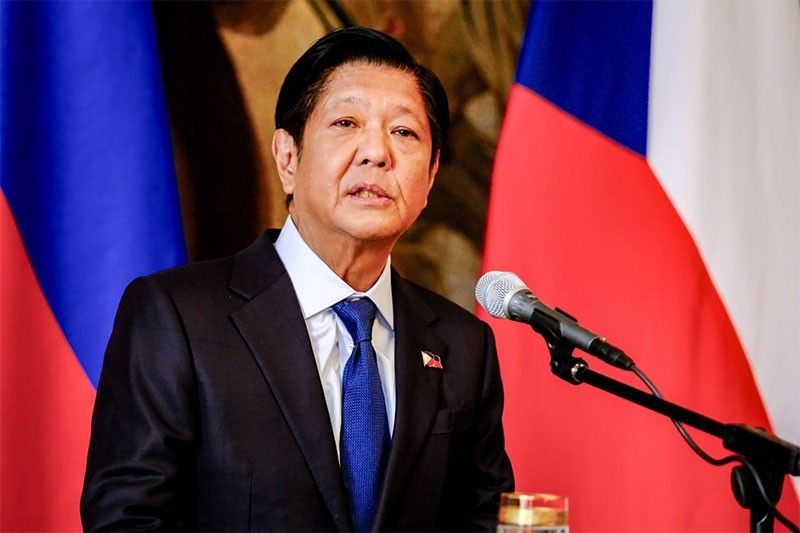Summit deals won’t affect China investments – Marcos

WASHINGTON – The expected influx of investments from the US and Japan that stemmed from the historic trilateral summit won’t affect China’s investments in the Philippines, President Marcos said yesterday.
Last Friday’s summit, hosted by US President Joe Biden here and attended by Marcos and Japanese Prime Minister Fumio Kishida, was widely perceived as a response to China’s aggression in the South China Sea, although its discussions covered not just defense but also economic cooperation.
Philippine Ambassador to the US Jose Manuel Romualdez recently said Manila may reap at least $100 billion in investments from Washington and Tokyo in five to 10 years as a result of the event.
Asked during a press briefing here how the outpouring of investments from the US and Japan would affect China’s economic influence in the Philippines, Marcos replied, “I don’t see how the two are connected.”
“China will continue whatever investments it chooses to make. This is separate from any proposed or potential Chinese investments in the Philippines. How do I see it? How will it affect? I don’t see that it will affect, one way or the other,” he added.
The sectors that are expected to benefit from the investments include the semiconductor industry, energy and manufacturing. Marcos expressed optimism that the estimated $100 billion worth of investments from the US and Japan would materialize.
“They have already committed to these investments and the fact that they actually have, we have together identified the areas and the sectors where that investment will go to. It shows that this is not a promise, or it is not just an idea. It is something that we intend to do because it has been put into the agreement,” the President said.
“So, I am very confident that this will all materialize and all of us in the Philippines will feel this,” he added.
According to Marcos, the trilateral agreement is not something that is only about convenience or borne out of a new situation but “a continuing evolution” of the Philippines’ relationship with the US and Japan.
“And this is evidenced by the fact that a large part of the agreement is on economic proposals, and economic assistance and partnership between the three countries. Security and defense, of course, is there. But that is not the main point of the trilateral agreement,” he said.
During the summit, the three countries committed to cooperate on the Luzon Economic Corridor, which will boost the connectivity among Subic Bay, Clark, Manila and Batangas in the Philippines; develop critical and emerging technologies and ensure clean energy supply chains.
Marcos said the trilateral agreement is “extremely important” and is going to change the dynamic in the region for the better. He added that the trilateral agreement would be a “big benefit” to the Philippines, which he said is still struggling to completely come out of the pandemic
“I’m sure you know by now I’m a great believer in coalitions and alliances. So, that is a major step for the Philippines, for the US and for Japan. I think in the years to come we’ll begin to see the wisdom of it. We’ll start to see – actually not even years – within the year we will start to begin to see the wisdom of having that trilateral agreement and why it is a good thing to enter into,” the Chief Executive said.
Investment surge
Speaker Martin Romualdez expects a surge in investment inflows in the Philippines as a result of the country’s hosting of the 6th Indo-Pacific Business Forum next month.
According to Romualdez, the event is expected to generate more jobs and livelihood opportunities for Filipinos.
“I am confident that the 6th Indo-Pacific Business Forum will serve as a springboard for increased investment inflows into the Philippines,” he said.
This developed as Marcos extended his invitation to top US business leaders to participate in the event in Manila on May 21, during his keynote address at the Philippine-US Business Forum on Friday in Washington, on the sidelines of the Philippines-US-Japan trilateral meeting.
“By bringing together key stakeholders to discuss critical issues and explore collaboration opportunities, we aim to propel the country’s economic growth and development to new heights, creating more jobs and livelihood opportunities for our people,” he added.
The business forum in Manila is expected to bring together some 500 business leaders, project developers, government officials and financing sources to discuss topics such as infrastructure, supply chain resilience, critical minerals, clean energy, the digital economy, emerging technologies and inclusive trade.
Meanwhile, Sen. Imee Marcos said the Luzon Economic Corridor was a welcome development, although she expressed hope Mindanao would also be developed.
The investment partnership will involve the construction of infrastructure projects like rail, modernization of ports and investments on clean energy, semiconductor supply chains and agribusiness.
“This is a good development. This is the first time I am hearing of a Luzon corridor. But many are asking why not talk about the development of Mindanao,” Marcos said in a dwIZ interview yesterday. — Sheila Crisostomo, Marc Jayson Cayabyab
- Latest
- Trending






























